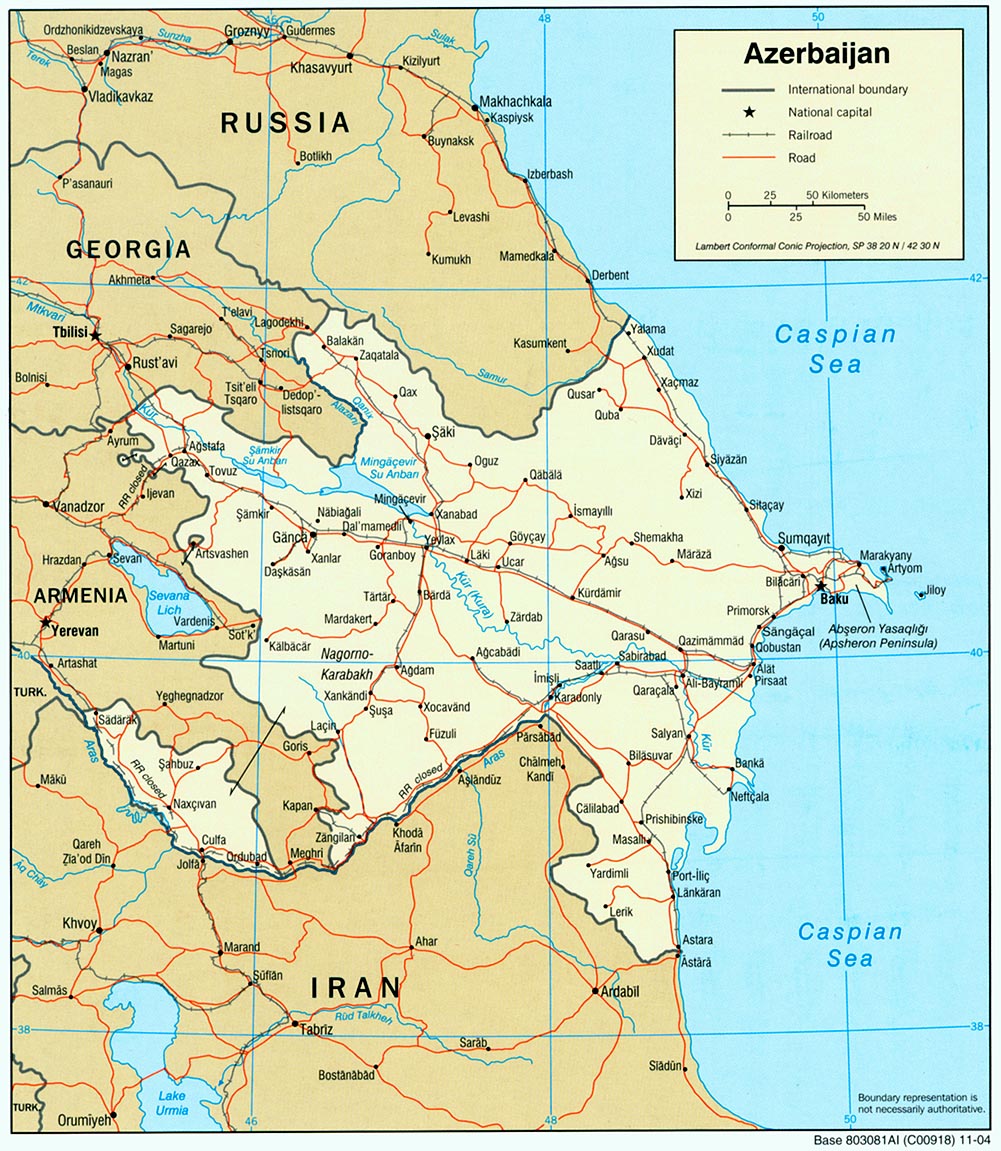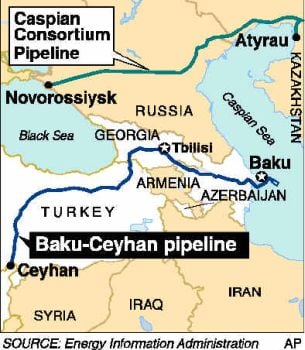 |
| Source: Perry-Castenda Collection |
For Israel and its partners in Washington and London, Azerbaijan provides prime territory to agitate against both Russia and Iran. If they wanted to bomb Iran, as former CENTCOM commander Joe Hoar described to Perry, the Israeli's "would save 800 miles of fuel" by launching from Azeri bases, making an increased payload possible. "That doesn't guarantee that Israel will attack Iran, but it certainly makes it more doable," Hoar said. Besides territorial proximity, around 17% of the Iranian population of 70 million is of Azeri ethnicity. Recently, there have even been calls in the Azeri parliament for the name of the country to be changed to North Azerbaijan, suggesting that the ethnic Azeri's in Iran live in a "south Azerbaijan" that needs to be freed.
This, however, is not a new partnership, according to a 2006 Middle East Quarterly article, as Israel made political inroads into Azerbaijan soon after the country gained independence following the Soviet crack-up:
In 1991, Azerbaijan was economically fragile, politically unstable, and militarily weak. Desperate for outside assistance, Baku turned to Israel to provide leverage against a much stronger Iran and a militarily superior Armenia. Israel promised to improve Azerbaijan's weak economy by developing trade ties. It purchased Azerbaijani oil and gas and sent medical, technological, and agricultural experts. Most importantly for Azerbaijan, Israel's foreign ministry vowed to lend its lobby's weight in Washington to improve Azeri-American relations, providing a counterweight to the influential Armenian lobby. According to Azerbaijan's first president, Abulfas Elçibey, "Israel could help Azerbaijan in [the] Karabakh problem by convincing the Americans to stop the Armenians."Azerbaijani diplomats recognized the need to diversify their contacts in Washington, especially after the U.S. Congress imposed sanctions on Azerbaijan at the behest of the Armenian lobby following the war in Nagorno-Karabakh. Azerbaijani military officials also believed that Israeli firms could better equip the ragtag Azerbaijani army, which needed new weapons following its defeat in Nagorno-Karabakh. On several occasions, Heydar Aliyev, Azerbaijan's president between 1993 and 2003, personally requested military assistance from Israeli prime ministers.
By the middle of the 1990's, Tel-Aviv began to solidify its relationship with Azerbaijan. First, in 1994, the Israeli telecommunications firm Bezeq bought a large share of the Azeri telephone operating system. Then, high-level official visits to Baku commenced, starting in 1996 by Health minister Ephraim Sneh, then in 1997 by Prime Minister Benjamin Netanyahu and in 1998 by a high-level Knesset delegation.
For the U.S., Azerbaijan was seen exclusively through a geopolitical lens, in terms of great-power spheres of influence over energy and security matters. In the 1980's, massive new oil and gas were discovered in the Soviet Union's Caspian Basin. When this area gained independence from Moscow in 1991, Washington moved to establish control over the Caspian region, in order to develop pipeline corridors to transport the petrofuels to sea, and European and Asian markets. For the U.S., the critical matter was bypassing the traditional powers in the region, Russia and Iran, and thus small and troublesome states like Azerbaijan, Uzbekistan, and Afghanistan had to be dealt with in order to reach the Mediterranean Sea and Indian Ocean. The Caspian port of Baku, the capital of Azerbaijan, was the starting point for one pipeline, the Baku-Tblisi-Ceyhan (BTC), which went from the Caspian through the Caucuses to Turkey and its Mediterranean coast.
In the process of building this geopolitical control, values like good-governance and human rights were sacrificed on the alter of energy security. The result was that a swath of Soviet era strongmen remained in power across the region, supported by Washington due to their fealty on energy and security matters. A frank assessment of the situation was made by a State Department official in early 1992, after Secretary of State James Baker made a whirlwind tour of the regions newly independent states: "some of these new countries are going to make it, and others are going to join the swelling ranks of third world basket cases, just limping along. Those that are most likely to make it are those like Turkmenistan that have economies based on agriculture, oil, gas and minerals." (New York Times, 2/15/92)
Azerbaijan, ruled by former KGB general Heydar Aliyev, was determined to be one of the countries that "made it." He heavily courted the major Western oil corporations, signing in 1994 a $7.4 billion oil concession deal with 10 companies, including BP and Unocal. According to a Mother Jones article, Aliyev went as far as to sign the deal into Azeri national law, as Azerbaijan lacked an adequate commercial code. More contracts with Chevron and ExxonMobil soon followed. To go along with the energy deals, Azerbaijan also sought out NATO, the Western Cold War military alliance, through the Partnership for Peace military training program. Azerbaijan was one of the first states to join the program, with President Aliyev signing the framework in a 1994 visits to NATO headquarters.
But despite this high-level cooperation, Azerbaijan and its Caspian brethren faced an image problem in Washington D.C., but this would not last long. From the middle of the 1990's on, numerous think-tanks, academic centers, and industry lobbying groups were formed to create political support for the Caspian region's authoritarian regimes.
One prime example is the the U.S.-Azerbaijan Chamber of Commerce, formed in 1996 and uniting security politicos like Zbignew Bryzinski and Richard Armitage with oil executives from Unocal, Chevron, BP, and Exxon. Soon after the Chamber formed, Haliburton CEO Dick Cheney also joined its board of directors. Another example is the Central Asia and Caucuses Institute established in 1996 at John Hopkins' School for Advanced International Studies, during Paul Wolfowitz's tenure as Dean. The Institute was run by S. Fredderick Starr, a long-time Soviet scholar, described by Ken Silverstein, the Washington Editor of Harper's Magazine, as viewing the region "almost exclusively through the prism of American geopolitical interests and with little interest in issues like human rights and corruption.” Accordingly, Starr and his institute sought personal relationships with many of the dictatorial leaders in Central Asia. Starr even went so far as to write the preface to the English edition of Uzbek President Islam Karimov’s book, Uzbekistan on the Threshold of the Twenty-First Century. In 1999, Harvard started a similar initiative, the Caspian Studies Program and Azerbaijan Initiative, led by Graham Allison, and heavily funded by through a $1 million grant by the Azerbaijan Chamber of Commerce.
When the U.S. initiated its post 9/11 "War on Terror" policies, Azerbaijan was quick to provide assistance. In 2002, it provided a small contingent of troops to NATO's ISAF force in Afghanistan, and granted overflight rights to U.S. Air Force planes en route to the newly established military bases in Uzbekistan and Kyrgyzistan. It also gave political support to the 2003 American invasion of Iraq. When Aliyev's son Ilhem rose to power in late 2003, following his fathers mysterious disappearance, the U.S. government fell head over heals to support him. Even though the U.S. embassy in Baku had spent millions promoting a "fair" election in 2003, they made no move when the government forces viscously cracked down on election-night protests, injuring 300. Shortly after the election, U.S. Deputy Secretary of State Richard Armitage, who had been one of the founding directors of the U.S.-Azerbaijan Chamber of Commerce, called the new Aliyev and commended his "strong performance at the polls and reiterated [America's] desire to work closely with him and with Azerbaijan in the future."
After more than a decade of "War on Terror" policies, the West and Azerbaijan are now closer than ever. NATO has established an international school in Baku, and Israel is a major arms partner with the State. In February 2012, Israel signed a $1.6 billion arms deal with Azerbaijan, which provided Baku with advanced drones and missile defense technology. One of these drones even crashed over Turkish waters, and Israel sheepishly denied that it belonged to them.

Hello Everybody,
ReplyDeleteMy name is Mrs Sharon Sim. I live in Singapore and i am a happy woman today? and i told my self that any lender that rescue my family from our poor situation, i will refer any person that is looking for loan to him, he gave me happiness to me and my family, i was in need of a loan of $250,000.00 to start my life all over as i am a single mother with 3 kids I met this honest and GOD fearing man loan lender that help me with a loan of $250,000.00 SG. Dollar, he is a GOD fearing man, if you are in need of loan and you will pay back the loan please contact him tell him that is Mrs Sharon, that refer you to him. contact Dr Purva Pius,via email:(urgentloan22@gmail.com) Thank you.